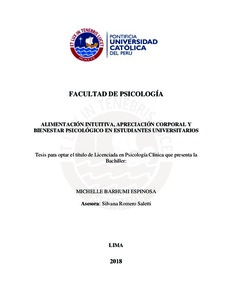| dc.contributor.advisor | Romero Saletti, Silvana Melissa | es_ES |
| dc.contributor.author | Barhumi Espinosa, Michelle | es_ES |
| dc.date.accessioned | 2018-12-06T17:36:41Z | es_ES |
| dc.date.available | 2018-12-06T17:36:41Z | es_ES |
| dc.date.created | 2018 | es_ES |
| dc.date.issued | 2018-12-06 | es_ES |
| dc.identifier.uri | http://hdl.handle.net/20.500.12404/13094 | |
| dc.description.abstract | La presente investigación busca identificar si es que la alimentación intuitiva y la apreciación
corporal predicen el bienestar psicológico en una muestra de 131 estudiantes universitarios
entre 18 y 27 años de edad. Para llevar a cabo la investigación, se utilizó la Escala de
Alimentación Intuitiva (IES-2), la Escala de Apreciación Corporal (BAS) y la Escala de
Bienestar Psicológico (SPWB). La aplicación se realizó de manera grupal. Se probaron tres
modelos de regresión y se encontró en el primero que la apreciación corporal y la
alimentación intuitiva predicen el bienestar psicológico. En el segundo se reemplazó la
alimentación intuitiva por sus cuatro áreas y se encontró que sólo una de ellas aportaba
significativamente al modelo. Así, en el tercero se colocó la apreciación corporal y el área
“comer por razones físicas” y se obtuvo un modelo significativo. Además, se encontraron
diferencias significativas entre hombres y mujeres para el puntaje global de la alimentación
intuitiva, el área “comer por razones físicas” y el área “autonomía” del bienestar psicológico.
No se encontraron diferencias significativas para la apreciación corporal. | es_ES |
| dc.description.abstract | The present study has the purpose to identify if intuitive eating and body appreciation can
predict psychological well-being in a sample of 131 students between the ages of 18 and 27.
In order to develop the study, the Intuitive Eating Scale (IES-2), the Body Appreciation Scale
(BAS) and the Psychological Well-Being Scale (SPWB) were used. Participants took the
survey in groups. Three regression models were tested, the first model showed that body
appreciation and intuitive eating predict psychological well-being. In the second, intuitive
eating was replaced by its four areas and it was found that only one of them contributed
significantly to the model. Thus, in the third one, body appreciation and "eating for physical
reasons" were placed as independent variables and a significant model was obtained. Also,
significant differences between men and women were found in the total score of the intuitive
eating scale as well as the area “eating for physical reasons”. No differences were found for
body appreciation, and significant differences were found for the area “autonomy” of
psychological well-being. | es_ES |
| dc.language.iso | spa | es_ES |
| dc.publisher | Pontificia Universidad Católica del Perú | es_ES |
| dc.rights | info:eu-repo/semantics/openAccess | es_ES |
| dc.rights.uri | http://creativecommons.org/licenses/by/2.5/pe/ | * |
| dc.subject | Hábitos alimenticios | es_ES |
| dc.subject | Bienestar | es_ES |
| dc.subject | Estudiantes universitarios--Investigaciones | es_ES |
| dc.title | Alimentación intuitiva, apreciación corporal y bienestar psicológico en estudiantes universitarios | es_ES |
| dc.type | info:eu-repo/semantics/bachelorThesis | es_ES |
| thesis.degree.name | Licenciado en Psicología con mención en Psicología Clínica | es_ES |
| thesis.degree.level | Título Profesional | es_ES |
| thesis.degree.grantor | Pontificia Universidad Católica del Perú. Facultad de Psicología | es_ES |
| thesis.degree.discipline | Psicología con mención en Psicología Clínica | es_ES |
| renati.discipline | 313026 | es_ES |
| renati.level | https://purl.org/pe-repo/renati/level#tituloProfesional | es_ES |
| renati.type | http://purl.org/pe-repo/renati/type#tesis | es_ES |
| dc.publisher.country | PE | es_ES |
| dc.subject.ocde | https://purl.org/pe-repo/ocde/ford#5.01.00 | es_ES |






